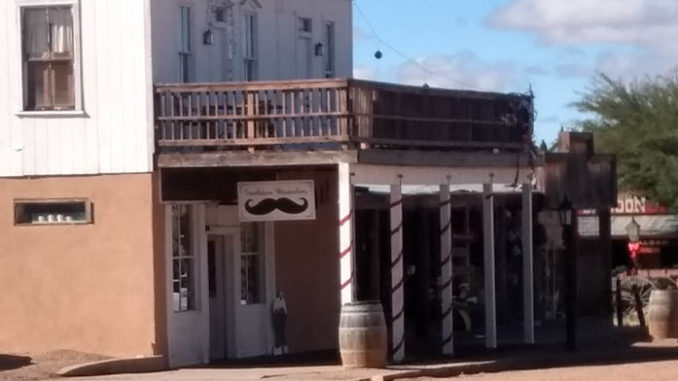
A property dispute involving a popular business in Tombstone’s historic district has led a Cochise County judge to issue an order preventing an eviction action while the parties litigate the matter.
Read more from Terri Jo Neff >>
Kevin and Sherry Rudd own Tombstone Mustachery, a specialty store and barber shop they operate at 325 Allen Street across from the OK Corral. They purchased the building and real estate from Scott Clay and his sister Denise Clay-Vaishville in February 2018 but both sides are now suing each other.
On Dec. 19, Judge David Thorn ruled that a temporary restraining order put in place in October when the Rudds filed their fraud and breach of contract lawsuit against the Clays will remain in effect. However, the judge is requiring the Rudds to post a $1,900 monthly bond or have the restraining order dissolved which will allow the Clays to proceed with eviction.
In their lawsuit, the Rudds claim they signed a contract to purchase the Allen Street property for $394,000. They were to pay $2,000 monthly until the close of escrow and receive a $50,000 purchase credit for work they performed to repair and improve the property. The balance of the purchase price was to be paid off when the Rudds closed escrow on a commercial loan.
But that never happened, the Rudds say, because in May 2019 they made a discovery that caused their lender to put a halt to the loan.
That discovery was the existence on the property of a hydraulic lift which was concealed by a stage structure and not disclosed by the Clays. It is the type of lift used in automotive repairs and poses what the Rudds’ attorney Robert Stachel described as “a significant structural and environmental hazard.”
According to Stachel, his clients have expended $75,000 in payments and sweat equity and would have had to commit another $10,000 to determine what soil or structural remediation would be required, if even possible. Instead, the Rudds took steps in spring 2019 to cancel the purchase contract.
However, the Clays’ attorney Andrew Carlson filed a counterclaim complaint and sought to have the restraining order voided so his clients can pursue a new buyer. He told the judge at the Dec. 19 hearing that things aren’t as the Rudds allege.
Carlson noted there is a question of when the Rudds knew they couldn’t secure financing to complete the purchase. The attorney also noted that after the lift issue came up the Rudds and a third-party entered into a $1,900 per month, month-to-month agreement with the Clays but only one month was paid.
The Clays counterclaim in the case will be heard by Thorn in conjunction with the Rudds’ lawsuit. The parties are expected back in court in 4-6 weeks for a status hearing.
